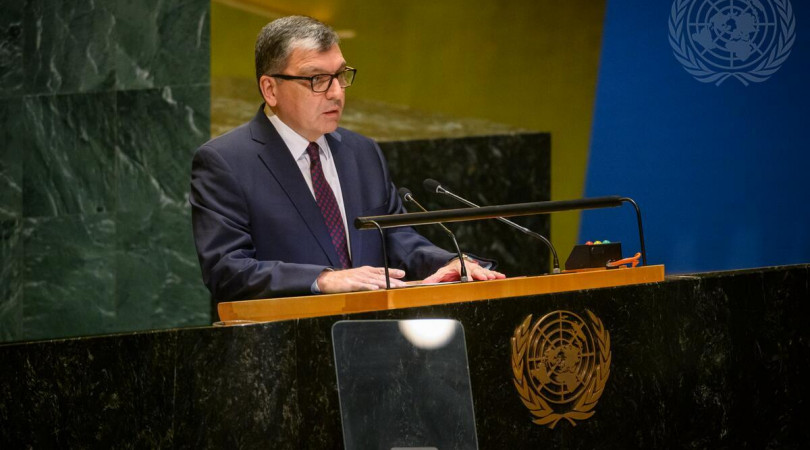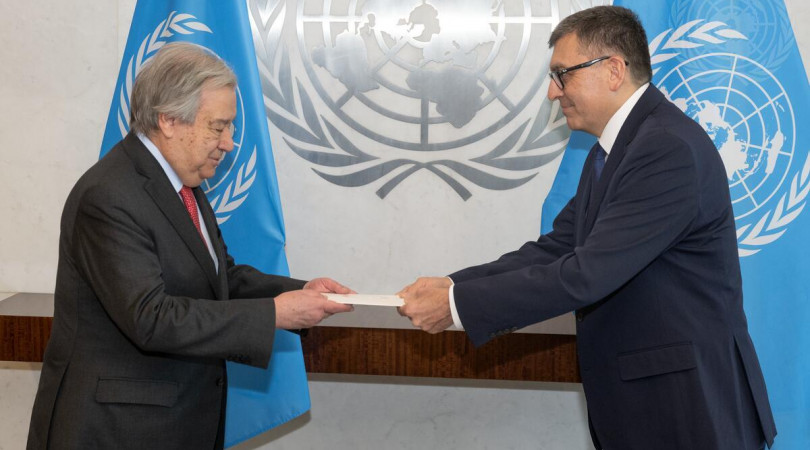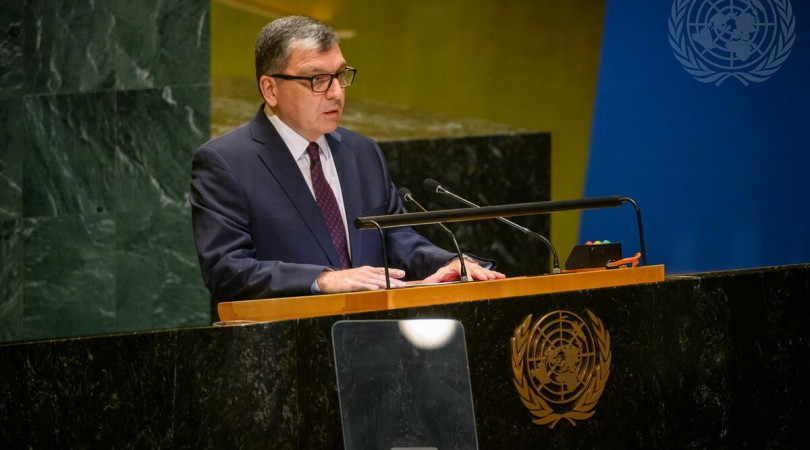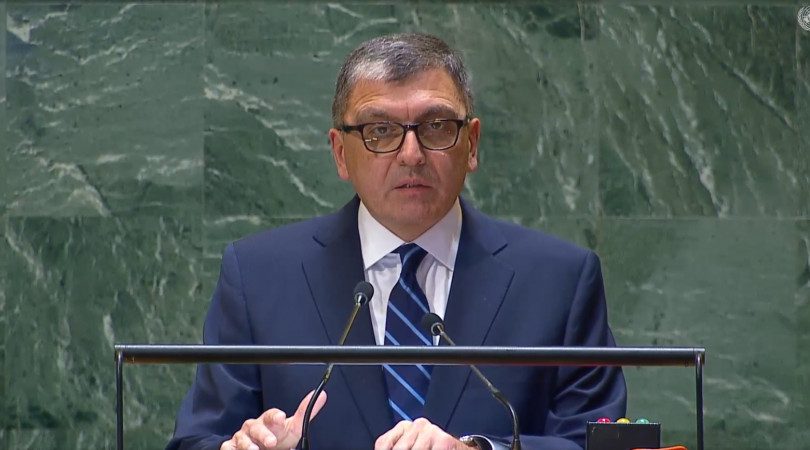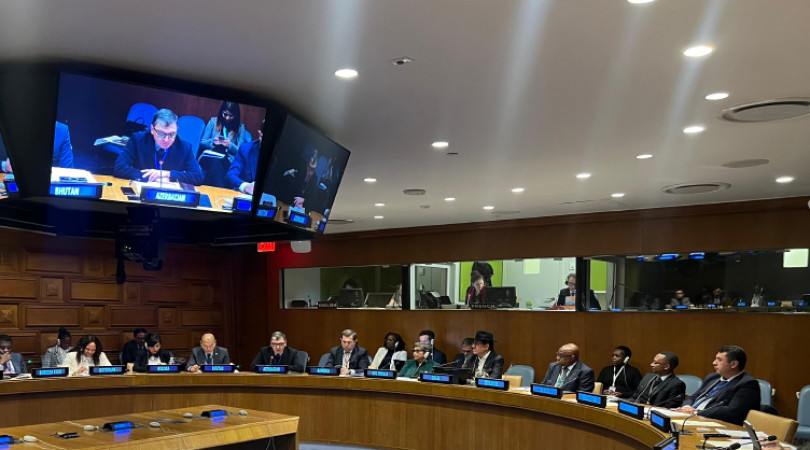Human rights
The Constitution adopted on November 12, 1995 set the beginning of a new era of state-building which bases on the maintenance of basic human rights. The provision of human rights and freedoms is proclaimed as a highest goal of the State in the Constitution of the Republic of Azerbaijan. The third chapter of the document titled “Fundamental rights and freedoms of a person and citizen” is composed of 48 articles which encompasses broad spectrum of human rights. Azerbaijan is a party to the fundamental international legal documents in the field of human rights. According to Article 148 of the Constitution, the international treaties, to which Azerbaijan is a party, constitute an inalienable integral part of Azerbaijan’s legislative system. According to Article 151 of the Constitution, in case of a possible contradiction between normative legal acts (except Constitution and acts adopted by referendum) of Azerbaijan on the one hand, and those international treaties to which Azerbaijan is a party, on the other hand, the norms of the international treaties shall apply. Human rights and freedoms have direct force in the territory of the Republic of Azerbaijan.
On February 22, 1998 The President of the Republic of Azerbaijan issued a decree “On the measures regarding maintenance of human rights and freedoms of a person and citizen”. With the Presidential order dated to June 18, 1998 the State Program on the protection of human rights was approved. On the basis of the abovementioned State Program Ombudsman institution was established in 2002.
In recent years the Republic of Azerbaijan has carried-out huge reforms in different spheres of social life. Steps taken with the purpose of adapting the legal system of Azerbaijan to international standards envisaged in the European Convention on Human Rights and other international documents hold important place among the reforms in the field of democratization of the country. The adoption of different laws and codes brought great importance to the strengthening of the legislative basis of the Republic of Azerbaijan.
On 1993 moratorium was declared on the execution of death penalty, and on February 10, 1998 the death penalty was abolished in the Republic of Azerbaijan.
With the Presidential order in Azerbaijan, firstly in the whole former USSR region, detention centres that had been subordinate to Ministry of Interior were subjected to the Ministry of Justice.
One of the main steps with regard to maintaining respect for human rights was the adoption of National Action Plan on the Protection of Human Rights. The National Action Plan that developed on the proposals by different governmental bodies, including the Ministry of Foreign Affairs, was approved by the President Ilham Aliyev’s order number 1889, dated December 28, 2006.
On 27 December, 2011 the National Action Programme on raising the efficiency of human rights protection in the Republic of Azerbaijan, was approved by the President. This Programme covers the issues mainly reflected in the recommendations addressed to Azerbaijan in course of consideration of its first UN Human Rights Council (HRC) Universal Periodic Review (UPR) report. The Action Programme envisages such issues as improvement of the normative-legal basis (including through definition of human rights and fundamental freedoms as a major criteria for drafting laws), improvement of activities of the state agencies, increasing transparency, training, research and awareness-raising measures on human rights, as well as cooperation with different international organizations in the field of human rights.
Along with accession to different international documents in human rights sphere, Azerbaijan also cooperates with a number of international organizations for this purpose. Different organizations of UN, OSCE, Council of Europe, and European Union are of special importance among them.
Azerbaijan effectively cooperates with UN High Commissioner for Human Rights in the field of protection and promotion of human rights. This cooperation is based on the technical cooperation document titled “Strengthening Capacities and Infrastructure for the Protection and Promotion of Human Rights in Azerbaijan” which had initially been signed in 1998, and which envisaged cooperation till 2000. Taking into account the importance of the issue a new Project document was signed between Azerbaijan Government and the Office on December 2001. Within the framework of the project different events (seminars, trainings, exchange of experience, publication of materials etc.) in the field of human rights were organized. The Ministry of Justice was the coordinator on behalf of Azerbaijani Government. One of the main achievements of Azerbaijan in the field human rights was the election of Azerbaijan in 2006 to the membership of newly established HRC. According to the UN General Assembly resolution A/60/L.48 UN General Assembly’s subsidiary body – HRC was established and that substituted Human Rights Commission. Azerbaijan was among the 47 member-states that became the first members of HRC. HRC started functioning on June 19, 2006.
The Government of the Republic of Azerbaijan has submitted Interim report to the Office of UN High Commissioner for Human Rights (OHCHR) and HRC in 2012. This Interim report covered the issues reflected in the recommendations addressed to Azerbaijan in course of consideration of its first UN HRC UPR report. Furthermore, OHCHR and HRC have been constantly informed on the measures taken with regard to the recommendations addressed to Azerbaijan during the consideration of its first UPR report.
The Republic of Azerbaijan conducts an ongoing fruitful cooperation with the Special Procedures of the HRC. The Government of Azerbaijan has been receiving all Mandate Holders under the UN Special Procedures, which sent letters requesting to visit the country. It should be also highlighted that in April 2013 the Government of Azerbaijan has sent a standing invitation to the special procedures mandate holders.
On 16-23 May 2012, A.Grover, the UN Special Rapporteur on the right of everyone to the enjoyment of the highest attainable standard of physical and mental health visited Azerbaijan.
On 30 April 2013, an interactive dialogue on the situation of human rights in Azerbaijan was held within the 16th session of UPR Working Group. During an interactive dialogue 77 states has delivered a speech and made recommendations with regard to situation of human rights in Azerbaijan. The measures taken by the Government of Azerbaijan in the field of human rights and freedoms, as well as the positive developments and some difficulties were highlighted during event.
The third periodic report of the Republic of Azerbaijan under the International Covenant on Economic, Social and Cultural Rights was considered on 3rd May 2013 within the 50th session of the Committee on Economic, Social and Cultural Rights in Geneva. The Committee members highly evaluated the high level of the Delegation, the opening statement of the Head of Delegation and the measures taken in the field of realizing the economic, social and cultural rights comprehensively reflected in the report. In this regard, the Committee members considered the very issues as good examples of the efforts of the Government of the Republic of Azerbaijan in the field of the provision of economic, social and cultural rights. The third periodic report of the Republic of Azerbaijan and the process of interactive dialogue were highly appreciated by the Committee members. It was mentioned that the efforts of the Republic of Azerbaijan on the implementation of the International Covenant on Economic, Social and Cultural Rights was noteworthy.
On 20 September 2013, the meeting was held in connection with the adoption of the report of the Working Group on UPR of the Republic of Azerbaijan within the framework of the 24th session of the UN HRC. 158 recommendations out of 162 submitted in total within the framework of the review fully or partially accepted by the Government of the Republic of Azerbaijan, the certain part of these recommendations had already been implemented and the other remaining recommendations were at the stage of realization. At the end of the meeting, the Report of the Working Group on the Universal Periodic Review of the Republic of Azerbaijan (A/HRC/24/13) was adopted by the HRC unanimously.
On 26 November-6 December 2013, R.Manjoo, the UN Special Rapporteur on violence against women its causes and consequences has visited Azerbaijan. In the Annex of her report to the 26th session of UN HRC mentioned that Nagorno Karabakh is a part of the Republic of Azerbaijan and referred to the relevant UN General Assembly and Security Council resolutions with respect to conflict. Moreover, in her report Special Rapporteur made a following recommendation: "the Special Rapporteur further recommends that the international community intensify efforts aimed at the speedy resolution of the issue of the occupation of land, in accordance with the norms and principles of international law and the provisions stipulated in GA resolution 62/243" which is "The situation in the occupied territories of Azerbaijan" ".
Mr. Murad N. Najafbayli, Ambassador, Permanent Representative of Azerbaijan to the United Nations Office and other international organizations in Geneva addressed a letter to the President of UN HRC with regard to violations of ceasefire regime by the Armed Forces of the Republic of Armenia. The mentioned letter was distributed as an official document of 25th session of UN HRC (A/HRC/25/G/5).
Mr. Murad N. Najafbayli, Ambassador, Permanent Representative of Azerbaijan to the United Nations Office and other international organizations in Geneva addressed a letter to the President of UN HRC with regard to the commemoration of twenty-second anniversary of Khojaly Genoside. The mentioned letter was distributed as an official document of 25th session of UN HRC (A/HRC/25/G/14).
The initial Report of the Republic of Azerbaijan on the implementation of its obligations under the UN Convention on the Rights of Persons with Disabilities was considered on 1-2 April 2014 within the 11th session of UN Committee on the Rights of Persons with Disabilities in Geneva, and the concluding observations was adopted. Azerbaijan was represented with the delegation headed by the Minister of Labour and Social Protection of the Population. The Committee commended the Republic of Azerbaijan for its efforts to improve its legislation, particularly the adoption of Law on Amendments to the Criminal Code of the Republic of Azerbaijan of 31 May 2011, as well as for initiating programmes on the rights of persons with disabilities, such as the State Programme on De-Institutionalization and Alternative Care 2006-2015 and the State Programme on Inclusive Education. The Committee further commended our country for establishing a working group under the Ministry of Labour and Social Protection of Population consisting of representatives from relevant government agencies and non-governmental organizations of persons with disabilities, which is mandated to coordinate the implementation of the provisions of the Convention in Azerbaijan. The Committee also welcomed the country for its role in cooperating with other States parties in the region on issues under the Convention. Besides, the proposal of the Committee on the option of submitting the next periodic reports under the Committee’s simplified reporting procedure has been considered acceptable and the Government of the Republic of Azerbaijan has decided to join to the simplified reporting procedure.
The Permanent Mission of the Republic of Azerbaijan to the United Nations Office and other international organizations in Geneva continues its contacts with the international non-governmental organizations dealing with issues of refugees and internally displaced persons (IDPs) in order to bring the issue of situation of refugees and IDPs of Azerbaijan to the attention of international community. On 26 March 2014 the Internal Displacement Monitoring Centre (IDMC) has published a report on Azerbaijan. The report highlights the following key points: root cause for the IDPs in Azerbaijan is the conflict between Armenia and Azerbaijan; Armenia controls Nagorno Karabakh and 7 adjacent districts; the territories that lived IDPs were occupied by Armenian Armed Forces; conflict is ongoing through the line of contact.
On 18-24 May 2014, C.Beyani, the UN Special Rapporteur on the human rights of internally displaced persons has visited Azerbaijan. Special Rapporteur will present his full report to the June 2015 session of UN HRC.
The members of UN Human Rights Council Working Group on Business and Human Rights, and UN Subcommitte on Prevention of Torture and Other Cruel, Inhuman or Degrading Treatment or Punishment (SPT) will pay their first ever official visits to the Republic of Azerbaijan on 18-27 August 2014 and 8-17 September 2014, respectively.

